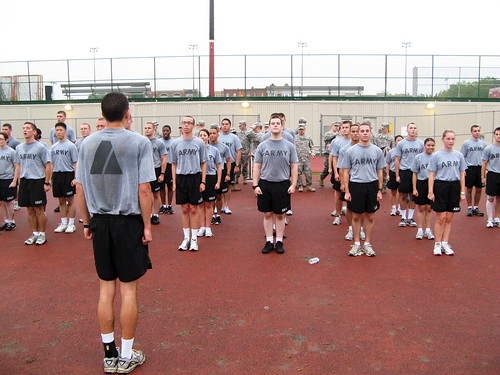
The military’s policy that banned gays and lesbians from serving openly was repealed.
After 18 years, the military’s controversial Don’t Ask, Don’t Tell policy was repealed on Sept. 20.
The policy, which banned gays and lesbians from openly serving in the United States military, was responsible for the discharging of more than 13,000 members of the armed forces for coming out or for being outed while serving since its inception.
Temple’s ROTC program operates under military policies and, therefore, was subject to the restrictions on serving openly that were enforced under DADT.
Lieutenant Colonel James P. Castelli, a professor of military science, said the implementation of the repeal is “not a difficult change for the soldiers on the ground” and that it was too early to tell if it would affect recruitment for the program.
Castelli added that “today’s military is more trained than before.”
“[The] army is very good at promoting diversity,” Castelli said. “The repeal of DADT is an example of the army’s efficiency.”
Under former President Bill Clinton’s administration, DADT was enacted in 1993 as a compromise with the republican members of Congress to allow gay and lesbian soldiers to serve as long as they did not reveal their sexual preference.
The ban on homosexual service members began in 1950 with former President Harry Truman’s Uniform Code of Military Justice, which, among other things, set up discharge rules for homosexual service members.
In 1982, former President Ronald Reagan stated that homosexuality was “incompatible” with military service and that people that engaged in homosexual acts or stated they were gay or bisexual would be discharged.
At the time, DADT was supported by some for the inclusive, yet secretive, integration of gays and lesbians into the armed forces but was opposed by others.
Dr. Gregory Urwin, professor of history and associate director at the center for the study of force and diplomacy, said “Congress made the law,” and that, although Clinton vowed to lift up the ban, he compromised with DADT.
While some universities have banned ROTC programs for certain policies in the past, Urwin said that there was “never a big effort” on the part of the administration, faculty, or students to boycott the ROTC at Temple.
“At the time [DADT] was passed it was progressive. It was a great step forward,” Jeff Fin, vice president of Purple Circle, a GLBT student organization, said.
This is not the only time in history when the U.S. military has made steps toward integration.
In the 1950s Truman ordered for racial integration to occur. Urwin said that the president was “confident that the military was going to comply.” But its integration was not fully achieved until the Korean War, Urwin said.
“The military have the toughest job in the world, [they] develop their own culture,” Urwin said.
Urwin said the military’s policies, which may reflect society values.
A March 2011 Pew Research Center Poll shows that 58 percent of Americans said homosexuality should be accepted, rather than discouraged, by society.
“I did not have a reaction [to the repeal,]” said Ashley Springfield, a junior accounting major. She added that it was a “small step toward civil rights.”
But for Fin, the repeal helps him feel as though “the promise of equality” is one step closer.
Still, the repeal of DADT is contingent upon the administration leading the country. As the 2012 presidential race gains momentum, some republican candidates have expressed interest in reinstating the DADT policy.
“[Gay rights are] generational to some extent, but [are] cultural too,” Urwin said.
The repeal of DADT was passed by the House of Representatives on Dec. 15 and by the Senate on Dec. 18. President Barack Obama signed the repeal provision into law on Dec. 22.
Josue Mercado can be reached at josue.mercado@temple.edu.


Thank you for this story. FYI – http://OutMilitary.com has been providing a supportive environment for friending, sharing and networking between Gay active military, vets and supporters since December, 2010.